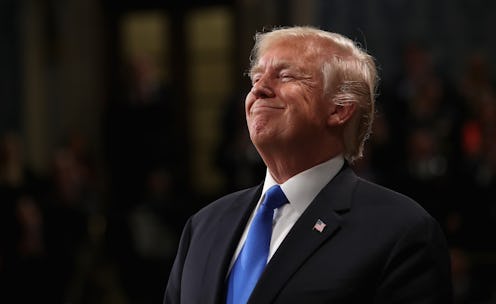News
Trump Was Nominated For A Nobel Peace Prize — Except He Actually Wasn't

President Trump wouldn't be the first sitting president nominated for the Nobel Peace Prize. The prestigious award famously went to President Obama during his first year in office. Yet it turns out maybe Trump wasn't nominated for the Nobel Peace Prize — because the submissions were forged. You might describe it as a rare case of real "fake" news.
On Tuesday, the Nobel Peace Prize committee announced its discovery of a purportedly fake 2018 nomination. They've referred the matter to the police force in Oslo, but U.S. investigative authorities have also been involved. Inspector Rune Skyjold, who heads up the Oslo police's economic crimes unit, said the FBI had been alerted to the situation. It's an indication that law enforcement believes the forgeries originated in the United States.
And apparently, this isn't the first time Trump's name has been falsely submitted. According to Olav Njolstad, secretary of the Nobel Peace Prize committee, they discovered a forged nomination for Trump last year as well.
“We receive many invalid nominations each year in the sense that they don’t meet the deadline or the nominator is not in fact qualified to nominate,” Njolstad told The Washington Post. “But to my knowledge this is the first example of a forged nomination where someone has stolen the identity of another person.”
The process of nominating and awarding the Nobel Peace Prize is an intentionally secretive one. A person must meet specific requirements in order to submit a nomination in the first place. And something about Trump's must have set off alarm bells — Njolstad told The Times, "We verify all nominations, at least the ones with a shadow of doubt."
Eight categories of people qualify to submit nominations to the Nobel Peace Prize committee. They include current high-ranking elected officials, members of the International Court of Justice and the Permanent Court of Arbitration at The Hague, those belonging to the Institut de Droit International, university professors and certain other university staff members, anyone who has previously been awarded the Nobel Peace Prize, current and previous members of the Nobel Peace Prize committee, and former advisers to the committee.
It's unknown as of now from which group the forgery came. However, Njolstad told the New York Times that the person who submitted Trump's nomination had stolen the identity of someone who would actually qualify as a legitimate nominator. Upon contacting the person under whose name had been used to nominate Trump, Njolstad implied that the person informed the committee the nomination was invalid.
As the reason for why Trump should receive the Nobel Peace Price, the forger apparently cited the president's "ideology of peace by force."
There are 329 candidates for 2018's Nobel Peace Prize, with 217 nominated individuals and 112 nominated organizations. As part of their longstanding tradition, the committee does not release details about the nominees. The recipient of the 2018 Nobel Peace Prize will be announced in October.
Members of the deliberating committee — responsible for deciding on the prize winner — are actually barred from discussing any details of their deliberation for a full 50 years. And even after five long decades of mandated silence, talking about the process is only allowed if the Nobel Peace Prize committee expressly grants license to do so — and only if it is for strictly scholarly purposes at that.
All of this makes the public release of Trump's reportedly forged nomination all the more fascinating. The Nobel Peace Prize committee has been recognizing awardees for over a century, and while there have been plenty of cases where their choice sparked controversy, this is a strange case of the process itself making headlines. That likely is due to Trump's ubiquitous name recognition, his divisive policies and persona, and record low international approval. It's difficult to imagine someone nominating him for a Nobel Peace Prize — and even more impossible to envision the peace prize committee awarding him one.